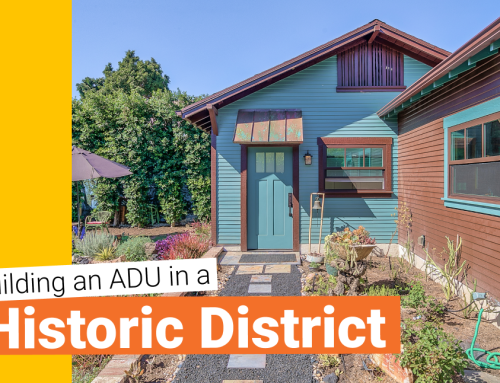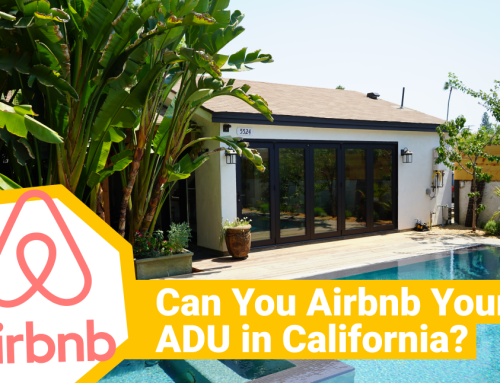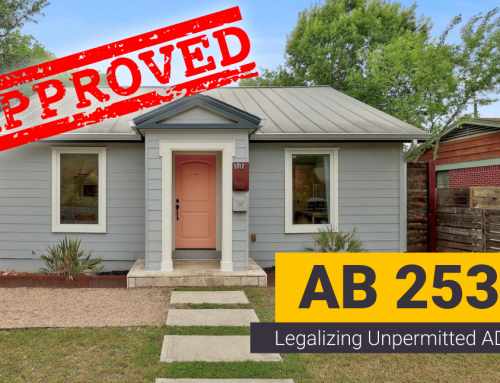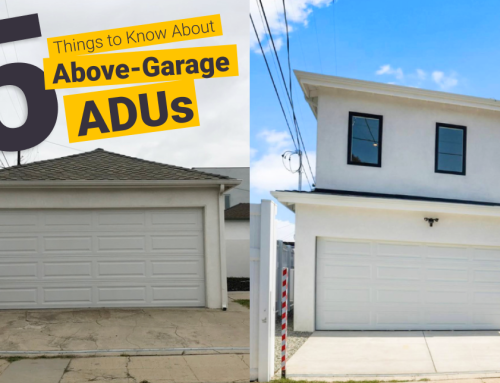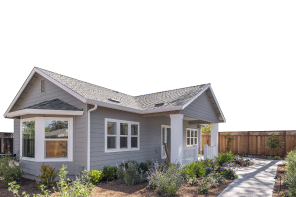With today’s affordable housing crisis, it feels more prudent than ever to look to ADUs as one possible solution.
According to a case study by Redfin, the median price for a single-family home in Denver was around $744k in June of 2022, compared to roughly $480k four years earlier. That’s an increase of almost 55%! This reality is hardly optimistic, especially for young adults buying for the first time.
Given these conditions, homeowners are eager to build an ADU on their property. As a result, ADUs have quickly gained in popularity in recent years, and we fully expect this trend to continue.
So, ready to learn more? Let’s dive in!
Are accessory dwelling units legal in Denver?
Yes, ADUs are legal in Denver!
Denver actually has quite a long history with ADUs. Since the city’s origin, ADUs were there in the form of “carriage houses.” These date back to as early as the 1880s! If you pay Denver a visit, you can actually still see these historic buildings within some of the older neighborhoods.
As time passes, Denver continues to rapidly grow and real estate prices continue to rise. This is why more and more ADU builds are expected in the coming years to provide accessible housing amidst the shortage.
How much does it cost to build an ADU in Denver, CO?
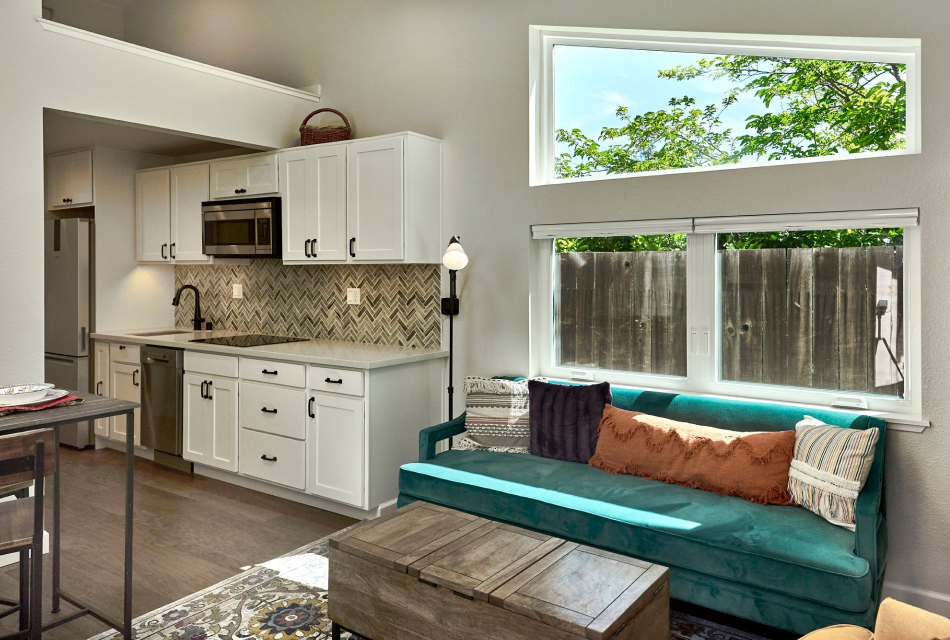
The price range to build an ADU in Denver is generally between $200,000 – $400,000+. While $200k is on the low end of the spectrum, it’s likely that your ADU will cost more.
The price of your ADU depends on:
- Type of construction
- Size
- Number of bedrooms and bathrooms
- Quality of finishes
- Lot characteristics
- Availability of material and labor
If these numbers seem shocking to you, you’re not alone. Homeowners often underestimate the cost to build an ADU. But it’s important to understand that building an ADU is not all that different from building a traditional, 2,000-square-foot house. Both require the same elements; ADUs simply have a smaller footprint.
People often try to use the cost-per-square-foot method to arrive at an estimate for their ADU.
Our advice? Avoid it! Using the cost-per-square-foot method is deceiving, and here’s why.
Any home comes with fixed costs, regardless of size. Take design fees, for instance. These fees will not vary dramatically, regardless of how big or small your ADU is. Similarly, all ADUs are required to have a kitchen and bathroom, and that is expensive square footage no matter what. At the end of the day, building an ADU that’s 400 square feet versus 1,200 square feet will not really alter these fixed costs.
Keeping this in mind, be extremely wary of anyone who claims they can build your ADU for under $100k. We monitored hundreds of projects last year and saw the real numbers come through. While there are certainly ways to cut costs, it’s unlikely that your project will come in under six digits.
Yes, that goes for garage conversions too. We’ll go more into garage conversions later.
But don’t be discouraged! One of the simplest ways to keep costs down is by limiting the number of bells and whistles you add. The fancier you get with your design choices, such as vaulted ceilings or top-end appliances, the larger the price tag. It’s worth thinking about your must-haves versus other areas where you could be more flexible.
Check out our webinar we hosted about how to balance cost and quality in ADU design and construction to get an idea.
What kind of ADU can I build in Denver?
It’s up to you! You have several options to choose from. The trick is figuring out which one makes sense for you and your property. Each type of ADU has different factors to consider before you make a final decision.
Here’s a quick rundown of your choices.
Detached ADU
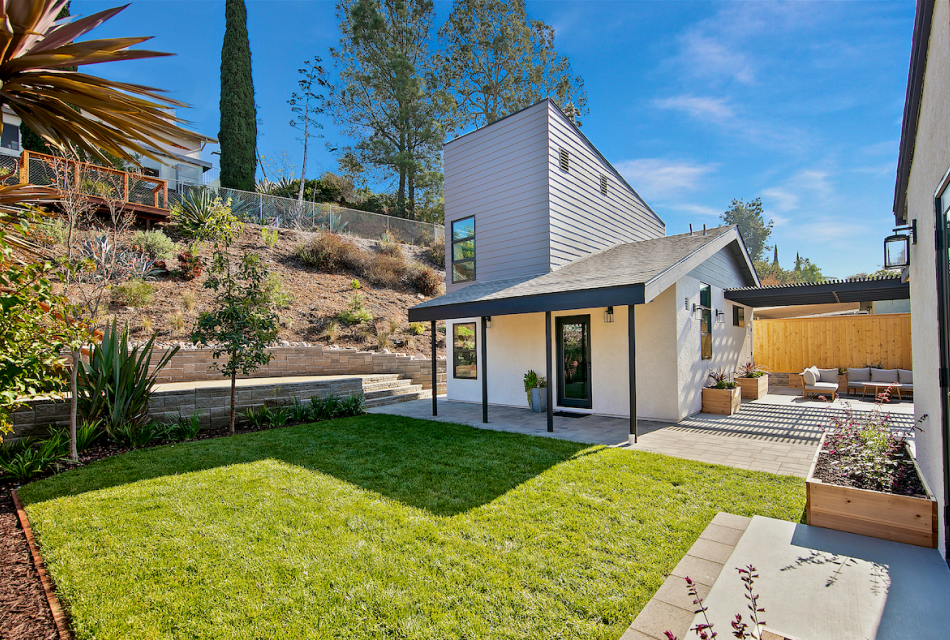
A detached ADU is a stand-alone building that is separate from the primary residence but on the same property, usually situated in the backyard.
If you’re looking to rent out the ADU, this is a great option given its ability to provide you and your future tenants with privacy. Detached ADUs are also great for housing adult family members or college-aged children. As you can see, there are so many ways to maximize a detached ADU.
Attached ADU
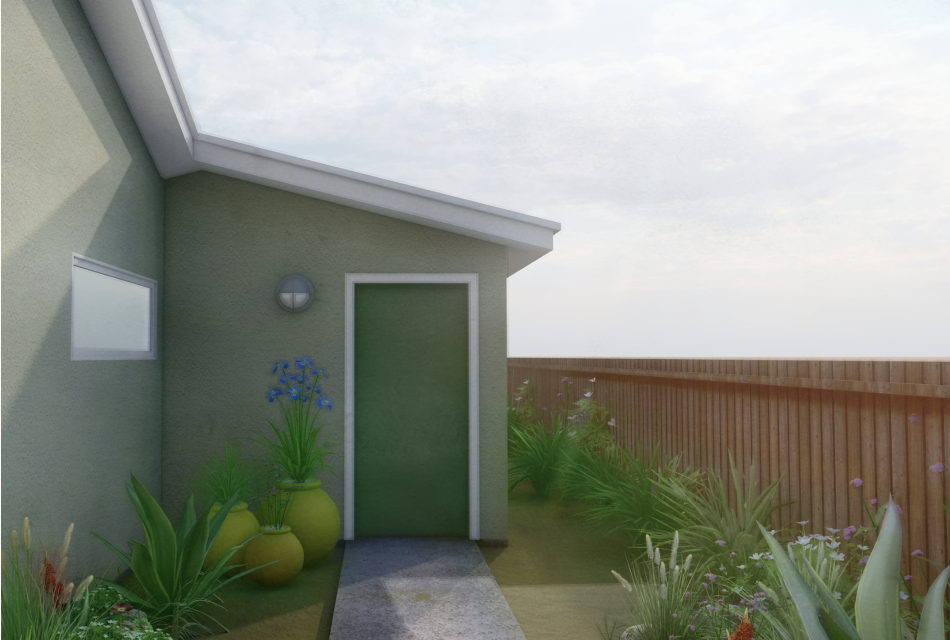
An attached ADU differs from a detached ADU because it is connected to the primary residence. They are sometimes wholly or partly created from an existing space, like an attached garage, attic, master suite, or rec room. And since they utilize an already existing space, choosing this option is a good way to save some money!
Garage Conversion ADU
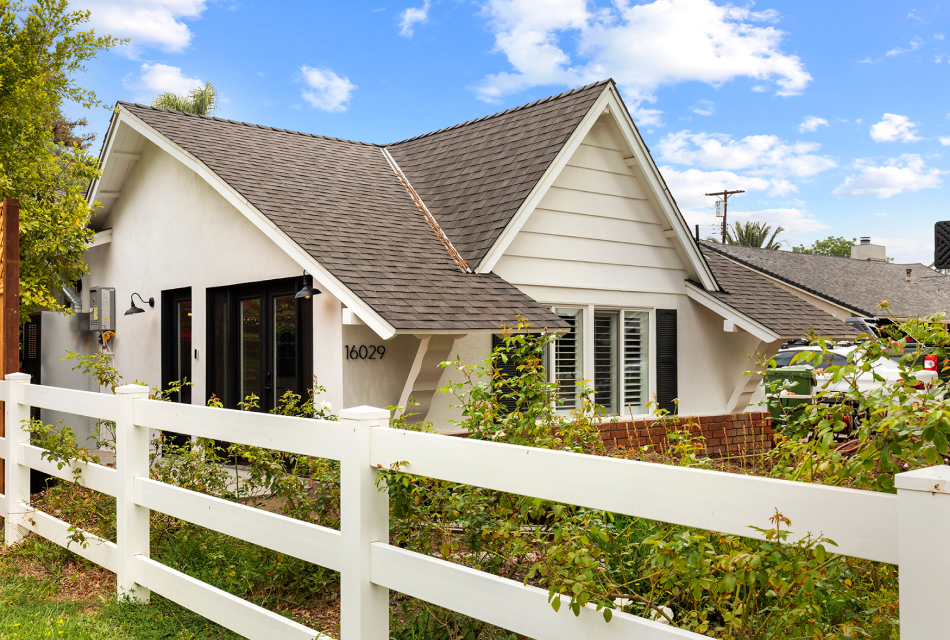
Garage conversions in Denver are possible, but pricey.
Why? Every garage in the city is built on a concrete slab. But according to Denver’s building code, a livable space must be placed on a concrete foundation that’s insulated and designed to prevent frost and other elements that could affect water, utilities, etc.
For that reason, your garage may have to be torn down and rebuilt from the ground up, which makes this option costly.
But on the other hand, garage conversions allow you to transform a once dingy, cluttered garage into a gorgeous, usable space. Over the years, we’ve seen homeowners truly redefine innovation with their creative designs, like these 37 garage conversion ideas you’ll drool over. Everything from adding a deck or sunroom to using the garage door to provide additional natural light are all possibilities in store!
Above-Garage ADU
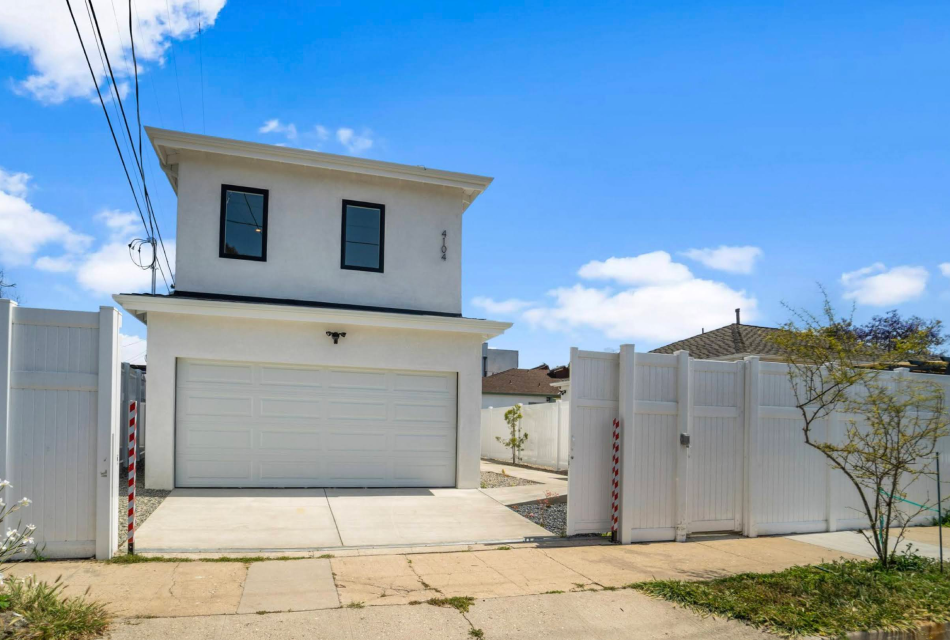
Some homeowners relish the storage and parking space their garage provides and aren’t eager to do away with it. In that case, above-garage ADUs are a highly desirable option. But it’s important to note that most garages, as well as the foundations under them, aren’t built to withstand the weight of an upstairs unit. So, it’ll need to be structurally enforced, making this option the most expensive type of ADU to build.
Nonetheless, these types of ADUs offer great privacy and amazing views. If you’re willing to shell out the extra cost, above-garage ADUs are excellent additions to any property. Learn if an above-garage ADU is right for you.
Basement ADU
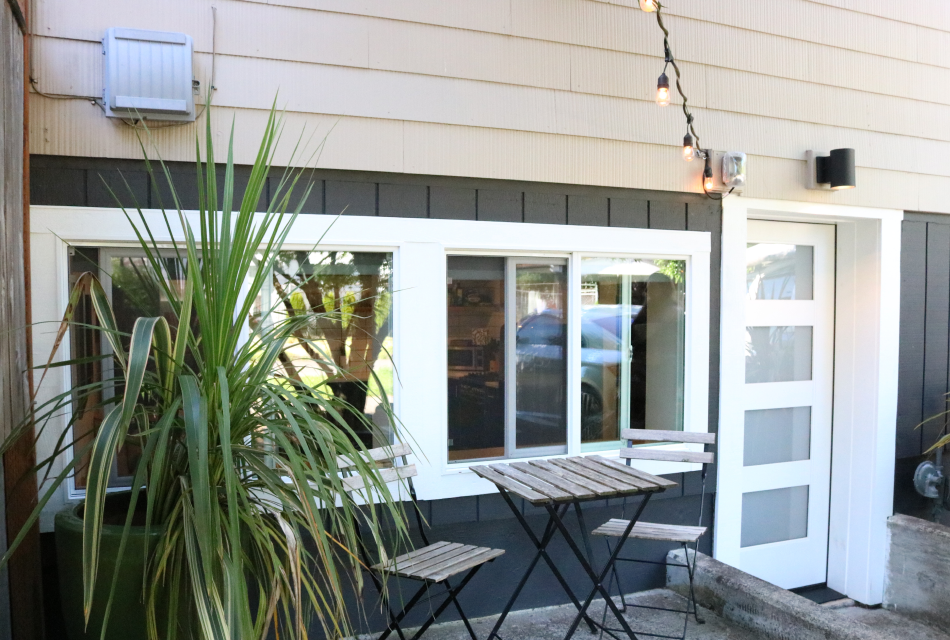
Basements have great bones and are more financially feasible options than other, more expensive types of ADUs. This is a fantastic choice for homeowners looking to transform their basement from gloomy to glamorous. Discover how to convert a basement into a living space, and take a tour of this 420-square-foot basement conversion!
Where can I build an ADU in Denver?
It completely depends on the specific zone district you are in. There are a couple of ways to find out if you can add an ADU to your property.
One way is to use this map to determine if your specific zone district permits ADUs.
Or, feel free to use this map to find your zone district, and then refer to the Denver zone districts descriptions and definitions to see what’s allowed in your district. This option also helps clarify the somewhat confusing zoning codes that are used.
Quick tip: If your zone district code has a TU (Two-Unit) in it or a 1 (ADUs allowed throughout) at the end, you’re in luck!
That being said, there are some rules for building on your property. In Denver, ADUs must:
- Be located in the rear 35% of the zone lot depth.
- Have 3 to 5 foot side setbacks, depending on the lot width.
- Have 5 foot rear setbacks.
- Abide by certain zone lot size minimums that vary by zone district. Refer to Denver zoning code.
- Abide by lot coverage maximums. Depending on your lot, your ADU can cover 37.5% to 50% of the lot. If you want to cover 50% of your lot, then 80% of the ground level must be designated to parking.
There are just a few more requirements you should know! First, ADUs are not allowed if there is more than one primary structure on the same zone lot. Also, your ADU must be built with materials that are compatible to those used on the main house. In other words, both units should have similar external appearances.
Lastly, single-unit (SU) zone districts also require you to live on-site, either in the main house or the ADU. It must be your legal and permanent residence. This prevents property owners from renting out both units.
If your lot is not zoned for an ADU, you can submit a rezoning pre-application form that the City Council would need to approve. Rezoning can take four to six months, and there is a $1,000 filing fee to factor in, but it’s worth a shot!
How many ADUs can I build in Denver, CO?
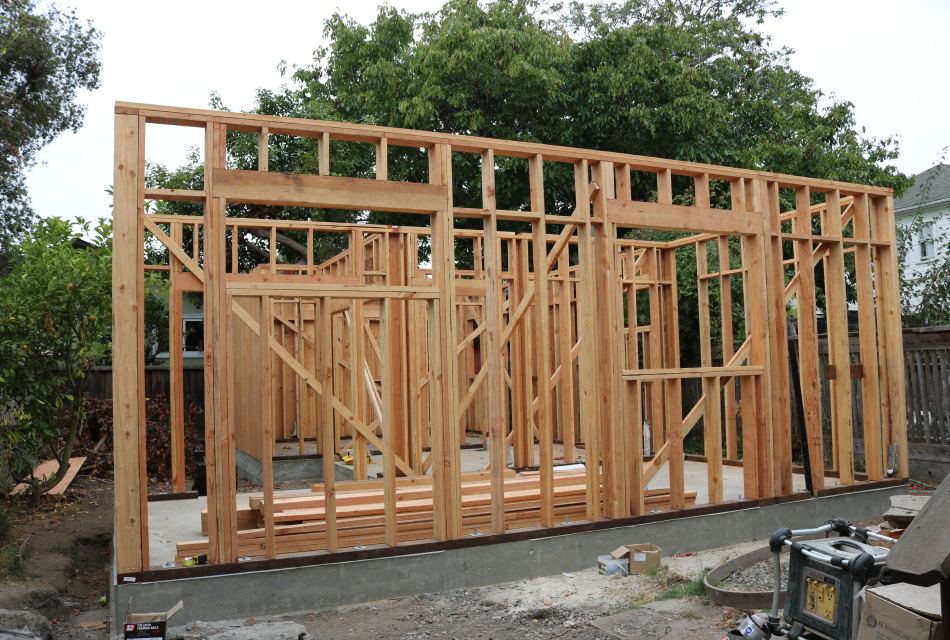
The Denver Zoning Code states that only one ADU can exist per zone lot. Remember, ADUs are accessory to a primary structure, and an ADU is not allowed if there is more than one primary structure on the same zone lot.
Even so, never underestimate the power of just one ADU! Over the years, we’ve heard so many stories of the vast benefits that even one ADU has provided homeowners.
How big can my ADU be in Denver?
In Denver, it typically depends on the size of your zone lot area.
- For lots 6,000 square feet or smaller, your ADU cannot exceed 650 square feet.
- For lots between 6,000 – 7,000 square feet, your ADU cannot exceed 846 square feet.
- For lots greater than 7,000 square feet, your ADU cannot exceed 1,000 square feet.
Some zone districts do things a bit differently, however, where they cap the maximum building footprint of the ADU at 1,000 square feet regardless of the lot size. So, make sure you know your specific zone district’s rules.
Detached ADUs have some specific size requirements, as well. They have a maximum height of 1.5 stories, as well as a maximum building length of 36 uninterrupted feet, regardless of lot size.
It’s also important to know that there must be at least 200 square feet of gross floor area per occupant to avoid overcrowding within the ADU.
Do I need a permit for an ADU?
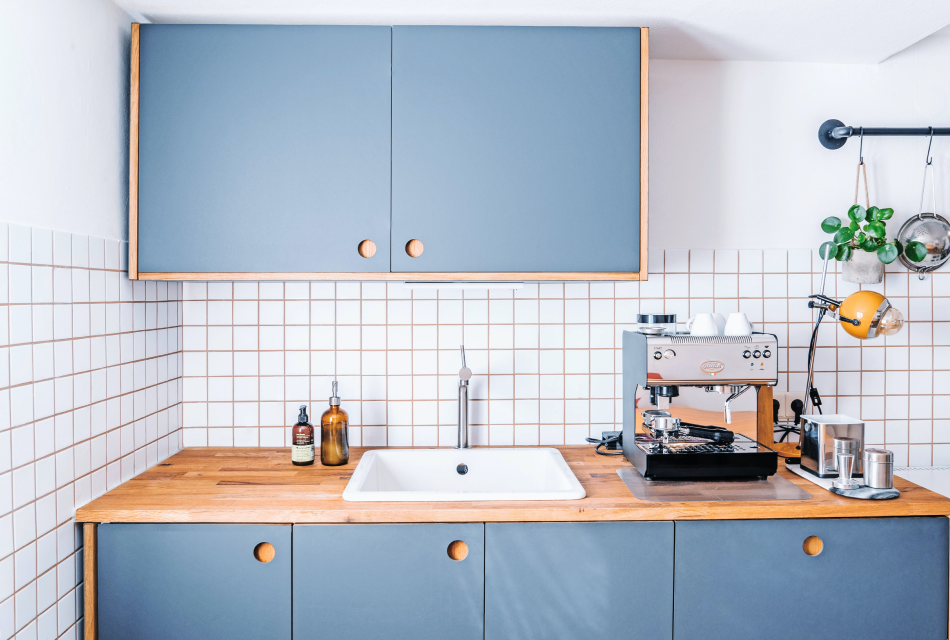
Yes. Everyone is eager to jump into construction, but you’ll first need to get your building permit approved by the city planning department.
Unfortunately, there’s really no one-size-fits-all timeline for getting your permit approved. Most ADU projects in Denver take at least 3 to 6 months if not longer, to get permits. But wait times can vary depending on the jurisdiction.
Some other permits you will likely need to obtain are plumbing permits, electrical permits, wastewater sewer use and drainage permit (SUDP), and more. Read on for a more detailed look into the permitting process and requirements for ADUs.
Even though permitting can be time-consuming, never skip it. Not only could you face a lawsuit if a tenant got injured inside the unpermitted ADU, but the city could force you to pay hefty fines if they find out. And the worst-case scenario? You have to tear down your ADU entirely.
Long story short, it’s much better to be patient!
Will my ADU need a parking spot in Denver?
Good news! There is currently no off-street parking required for ADUs. It’s no secret that requiring off-street parking racks up added costs and site constraints that could inhibit ADU construction altogether.
However, if there is an alley present, Denver zoning code requires any off-street parking for the ADU to be located off the alley. Street access parking (e.g., a driveway) is only allowed if there is no alley. But an extra driveway that is separate from the one for the primary house is not allowed; the driveway must be shared between both units.
How long will it take to design and build my ADU in Denver?
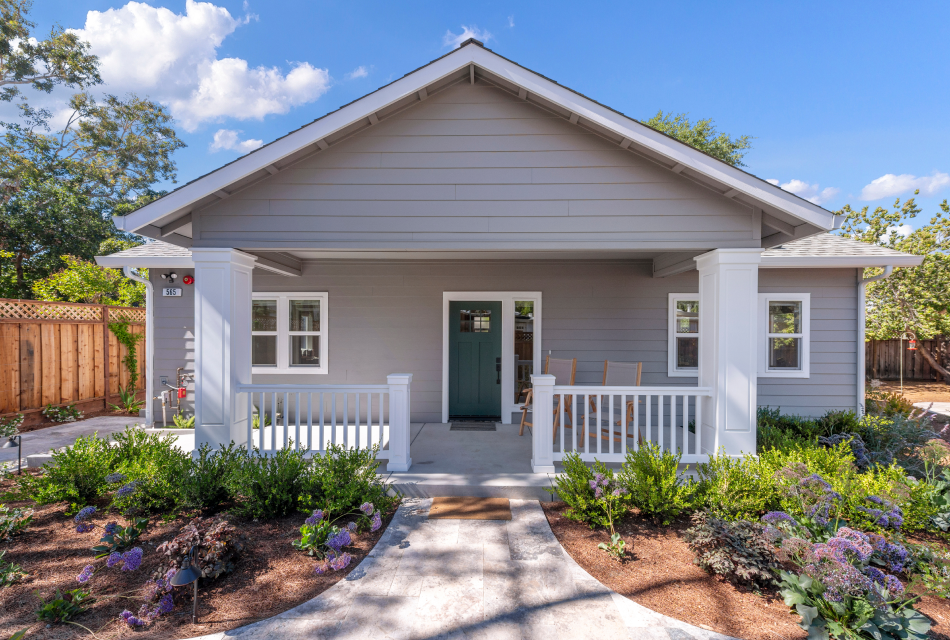
On average, ADUs take between 12 – 18 months from design to construction completion.
Why does it take so long? Well, there are a lot of factors that go into making an ADU happen.
There are four main phases: financing, design, permitting, and construction. Each phase has its own timeline, which can sometimes be impacted by factors entirely outside of your control.
Take the supply chain, for example. When the pandemic hit, home renovation projects across the country skyrocketed like never before. This made getting your hands on certain supplies like lumber rather challenging. You might even remember these difficulties firsthand!
Funky lot characteristics can also throw a wrench into things, as well as the backlog of work at your city’s planning department or simply bad weather conditions.
Can I rent out my ADU in Denver?
You most definitely can rent out your ADU in Denver! ADUs are great for short-term or long-term rentals in Denver. But here are a couple of points to take note of.
In order to rent an ADU in the short term on sites like Airbnb, you must maintain permanent residency in the primary house. However, the reverse cannot work. In other words, you cannot occupy the ADU and conduct short-term rentals for the primary residence.
To rent your ADU short-term (between 1 – 29 days), you will also have to apply for a short-term rental (STR) license. This license will need to be renewed each year. There is a $50 application fee and an annual $100 renewal fee.
Renting out your ADU more long-term (30+ days at a time) requires you to obtain a residential rental property license.
Whichever option you go with, opting to rent out your ADU is a great way to earn substantial passive income and increase your property value.
To give you a better idea, according to rentcafe.com, the average rent for an 841-square-foot apartment in Denver costs around $1,997 per month. ADUs usually yield higher rents thanks to their privacy and outdoor space, so we’d estimate you could rent your ADU for about $2,200. Not too shabby!
In addition to the passive income you’d accrue, there’s hardly a better way to afford an early retirement, a trip abroad, and more! And don’t forget the help it provides those looking for more affordable housing options. Truly a win-win scenario!
Consider Kylee and Steven’s success story, for instance. In 2017, they found the perfect property to buy. The only problem was its $1.2M price tag, which was especially daunting for a young couple. But they saw light at the end of the tunnel the moment they considered the 400 square-foot ADU above the garage.
The ADU was in dire need of a makeover, and that’s just what Kylee and Steven got to work doing. It wasn’t long before they began renting out the new and improved property and generating substantial passive income, allowing them to use their ADU to pay off their mortgage!
Plan, hire, and manage your ADU project with Maxable!
While times change, the need for housing does not. After consulting with thousands of homeowners and helping hundreds of complete ADUs, we’re more passionate than ever about accessory dwelling units!
Building an ADU is a big but rewarding commitment. At Maxable, we’re here to walk you through every step of the way. We’re eager to share our knowledge and connect you to designers and general contractors with proven experience in Denver. That way, you’ll have the proper support from beginning to end.
Download our free Maxable resources to kickstart your next ADU project today!


